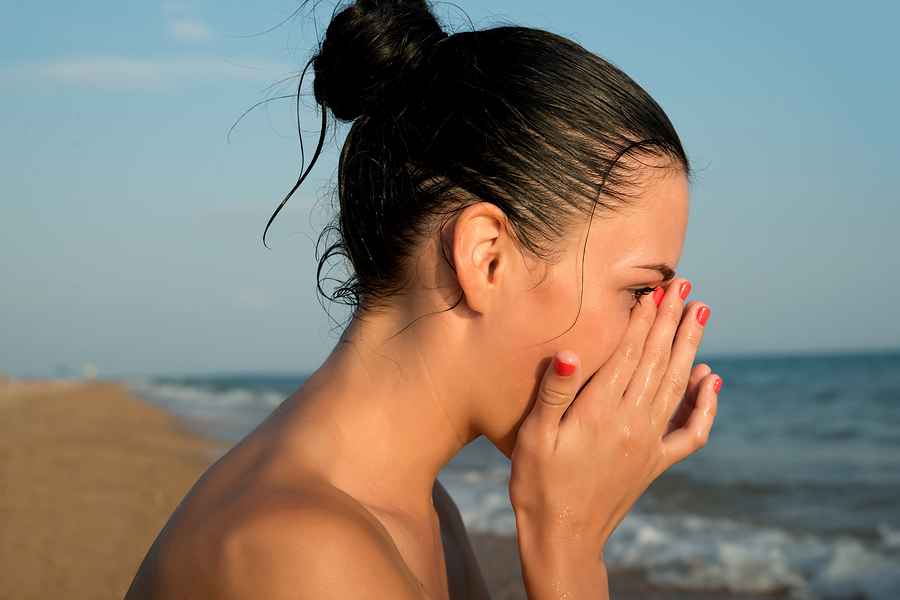For most, summer days are well spent at the beach or outdoor barbecues. For others, common beach allergies keep them at bay. Despite lower pollen counts at the beach than the inland, summer allergy triggers are pesky, especially around the shore.
Sunscreen Allergy
The use of sunscreens is a routine part of our lives as more people are taking precautions about sun-damaged skin and skin cancer. Unfortunately, chemicals found in sunscreens have also led to various allergic reactions such as contact dermatitis, an itchy, blistering skin rash that occurs within hours of sunscreen application.
Many active ingredients in sunscreens can cause contact dermatitis. Some of these chemicals include Para-Aminobenzoic Acid, Benzophenones, Cinnamates, Salicylates, Dibenzoylmethanes, and Octocrylene. While contact dermatitis can occur anywhere sunscreen is applied to on the body, inflammation occurs most often in the areas of the body with the most sun exposure.
Sun Allergy
Prolonged sun exposure can sometimes increase your risk of itching, hives or burning and stinging of the skin, especially in people with underlying medical conditions (such as lupus or porphyria) and people using various medications (such as high blood pressure medications). The most common types of sun allergy are solar urticarial, cholinergic uticaria and polymorphic light eruption.
Depending on each person, signs and symptoms usually occur on the skin typically within minutes to hours after sun exposure.
Swimming Allergy
Swimming in the ocean is fun and refreshing during hot summer days, but it can also leave some feeling itchy. Three main causes are swimmer’s itch, seabather’s eruption and seaweed dermatitis.
Swimmer’s itch occurs when people swim in contaminated water with parasites. Several parasites can linger in the ocean, waiting to bite or sting. When these parasites enter the human skin, it can cause an allergic reaction as it dies.
Seabather’s eruption is an allergic rash that occurs after being exposed to jellyfish larvae during a swim in the ocean. These larvae leave an itchy skin rash when trapped between a person’s skin and swimwear. The rash usually develops while the person is swimming, but may occur hours after swimming. In rare cases, a person may also experience symptoms from the toxin released by the larvae, such as fevers, nausea, vomiting, headache, and diarrhea.
Seaweed dermatitis occurs when a person is exposed to a poisonous type of seaweed found in the ocean waters. The symptoms usually develop after swimming when the skin dries out. Toxic chemicals from tiny bits of seaweed trapped in between the skin and bathing suit irritate the skin, forming an itchy rash.
Barbecue Smoke Allergy
Trees like mesquite, oak, cedar, and hickory are commonly burned to add flavor to barbecues and contain allergen in their wood and pollen. The allergen in pollen is present in the wood even after it is burned through combustion.
While the wood burns during the barbecue, the allergen stays in the smoke. It is transported through the air causing mild symptoms such as a runny rose, sneezing and watery, red eyes. It can also be transferred to food during the barbecue process, leading some to experience oral-related symptoms after eating foods that are cooked using an allergy-related wood source.
Soot produced when charcoal burns is also a leading cause to allergic reactions such as a runny nose, sneezing and difficulty of breathing among other skin and eye symptoms.
Insect Bites
Insects are everywhere, even the beach. For those allergic to yellow jackets or honeybees, insect stings are common beach allergies and found around picnic sites. Other bug bites include sand flies or sand fleas. Sand flies are tiny, biting bugs that are common along beaches. A bite often leaves a red, itchy bump – often itchier than mosquito bites and lasts longer. Home remedies and over-the-counter treatments (antihistamines) can help ease the symptoms.
Schedule a Consultation
If you have common beach allergies, it is important to seek the right medical help. An allergist/immunologist is a specialist in the diagnosis and treatment of allergies, asthma and other diseases of the immune system. Testing done by allergist can give you precise information about what your child is and is not allergic to. If you are allergic to any substances, you and your allergist can develop a treatment plan to manage or even get rid of your symptoms.
To get you started, discuss and review your treatment options in order find the perfect option for you. Schedule an appointment with Dr. Shukla today, for treatment options.

